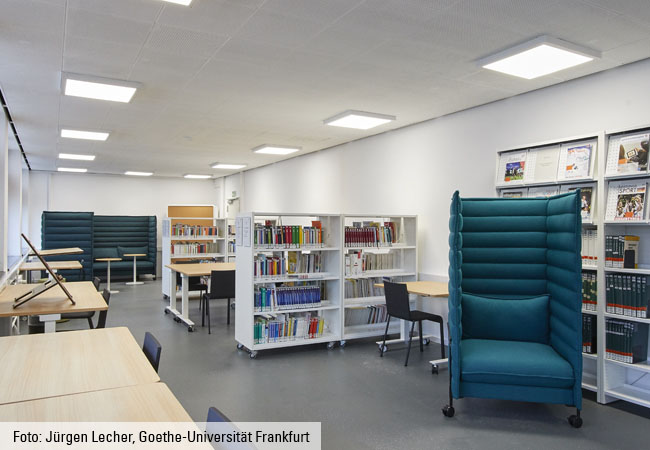Agnes Brauer to also lead the Digital Humanities Team
UniReport: Ms. Brauer, you are the new head of the Bibliothekszentrum Geisteswissenschaften (BzG) – Goethe University’s Humanities Library – and simultaneously lead the University Library’s Digital Humanities team. How does it feel to hold this dual role?
Agnes Brauer: I find this dual function challenging – in the best sense of the word. Both areas are undergoing significant transformation and offer a great deal of creative leeway, which I personally value highly. Fortunately, I have joined a wonderfully motivated, curious, and open team, which makes me very optimistic about the future development of both the BzG and the Digital Humanities unit.
What brought you to this position? Could you name a few stages of your education and career path?

I studied German and Philosophy at the University of Trier and had the opportunity to explore topics, methods, and technologies of the Digital Humanities during my studies. Approaching humanities content and questions with digital tools and concepts has captivated me ever since. During my time as a research associate in the field of Computational Philology at TU Darmstadt, I was closely involved in building and consolidating key infrastructure projects like TextGrid and DARIAH-DE. That’s where I came to understand the essential role of libraries as strong infrastructure partners – indispensable for the long-term support of research-driven projects and for ensuring the long-term availability of their results. At the same time, libraries provide the foundation for humanities research through their rich (digitized) collections, including large text corpora and high-quality metadata. So, when the opportunity arose to work at the University Library in Frankfurt – right at the intersection of humanities libraries and Digital Humanities – I didn’t hesitate.
The library is unusual in many ways: spread across the two outer wings of the IG Farben Building and vertically structured, with a very popular and impressive reading room. What do you personally like about it?
It’s precisely the special and unusual nature of the BzG that appeals to me. The many different spaces and varied usage options allow users to tailor their work and study environment to their needs. From open group workspaces with different zones and cozy furniture that invite relaxed interaction, to large, small, and very small reading rooms – everyone can find what suits them. I’m particularly fond of rooms or areas that function primarily as possibility spaces and therefore offer great potential for innovation. This year we will be setting up a DHLab – an experimental space for networking, knowledge transfer, and exchange in the field of Digital Humanities.
What are your goals for the near future?
My main goal is to position the library well for the future. Of course, the traditional analog collection will continue to play a central role in a humanities library, and the BzG team is doing outstanding work in maintaining and enhancing the high level of service quality. At the same time, we also need to acknowledge that a library’s relevance is no longer defined solely by its physical holdings. My aim is therefore to bring the library and its services more directly into the faculties – to support research, scholarship, and teaching as effectively as possible. This includes creating space for interdisciplinary exchange, providing infrastructure to support the research process – especially in terms of sustainability, standards, technological implementation, and resource planning – and offering training on topics such as digital editions, AI-assisted research, and data literacy. The traditional image of the silent book hall has changed – and rightly so. Today, well-equipped libraries are reliable research partners and an integral part of academic discourse. That is why the expansion of our services in the area of Digital Humanities – well beyond the existing “Digital Humanities Practice Lab” – is so important for our future course.












